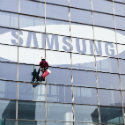
South Korean electronics giant Samsung has hit the gas pedal in the automotive sector with an $8 billion all-cash takeover move for Harman, which develops a range of connected car systems.
The acquisition would be Samsung Electronics Co. Ltd. (Korea: SEC)'s biggest ever and make it a driving force in the fast-developing market for connected car technologies, as companies like Apple Inc. (Nasdaq: AAPL), Google (Nasdaq: GOOG) and Uber also jostle for a place at the head of the queue.
The bid follows a turbulent spell for Samsung, whose brand has taken a beating amid reports that Galaxy Note 7 "phablets" have been catching fire and the subsequent withdrawal of those devices from the market. (See Samsung's Note 7 Nightmare to Hit Profits Into 2017.)
Samsung may hope the bid for US-based Harman gives market watchers something else to discuss than Note 7 combustibility.
About 30 million vehicles worldwide already use infotainment, telematics, safety and security systems from Harman, which made about $7 billion in revenues in its recent financial year and reckons 65% of sales were "automotive-related."
Samsung is eyeing a number of opportunities post tie-up, noting that Harman will be able to benefit from its expertise in areas such as 5G, semiconductor design and the manufacture of user displays.
The South Korean company's global distribution channels could also help to open new doors in the connected car market.
In addition, Samsung pointed out that Harman's range of audio brands, which include names like Harman Kardon and Bang & Olufsen, could be used to improve the competitiveness of its own mobile, virtual reality, display and wearable products.
Other opportunities it sees include being able to provide "large-scale" audio and visual solutions at stadiums for concerts and other events. Software expertise within Harman -- which employs about 8,000 software designers and engineers -- could also give rise to new cloud-based services.
Want to know more about the Internet of Things? Check out our dedicated IoT content channel here on Light Reading.
"Joining forces is a natural extension of the automotive strategy we have been pursuing for some time," said Oh-Hyun Kwon, the vice chairman and CEO of Samsung Electronics, in a company statement. "As a Tier 1 automotive supplier with deep customer relationships, strong brands, leading technology and a recognized portfolio of best-in-class products, Harman immediately establishes a strong foundation for Samsung to grow our automotive platform."
The fee of $8 billion is 28% more than Harman's market capitalization at close of business on November 11 and will be funded using cash on hand, said Samsung in its statement on the deal.
Harman is to remain a standalone business after the transaction, which still needs to be approved by Harman shareholders and regulatory authorities, and it will continue to be led by CEO and chairman Dinesh Paliwal.
Samsung expects the deal to close by the middle of next year.
Its share price closed down 2.82% in South Korea earlier today.
— Iain Morris, 

 , News Editor, Light Reading
, News Editor, Light Reading
Read more about:
AsiaAbout the Author(s)
You May Also Like




_International_Software_Products.jpeg?width=300&auto=webp&quality=80&disable=upscale)







